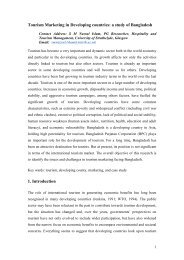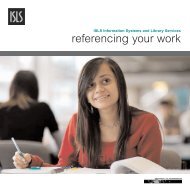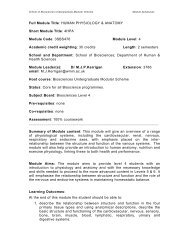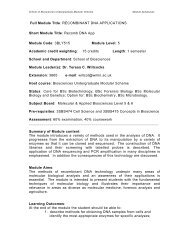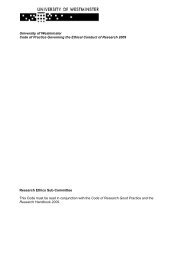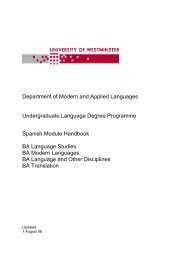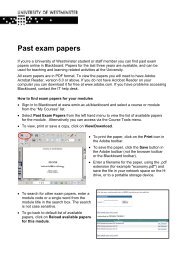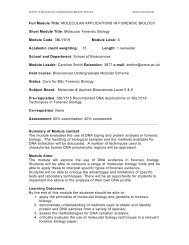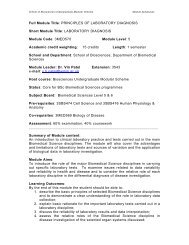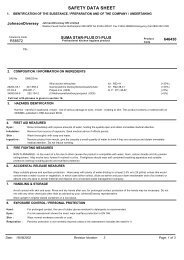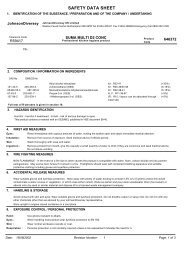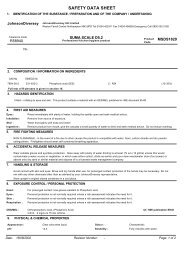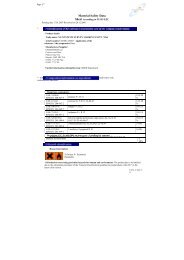CONTENTS 1. Introduction 1.1 Course Outline 1 1.2 Introduction ...
CONTENTS 1. Introduction 1.1 Course Outline 1 1.2 Introduction ...
CONTENTS 1. Introduction 1.1 Course Outline 1 1.2 Introduction ...
You also want an ePaper? Increase the reach of your titles
YUMPU automatically turns print PDFs into web optimized ePapers that Google loves.
Indicative syllabus content:<br />
• Self assessment reflective learning, theories of learning, learning styles<br />
• Skills awareness in context of the labour market; motivations, personality<br />
• Making the most of work and other experience<br />
• CVs (suitable for applying for work experience)<br />
• Action planning<br />
• Re-assessment of skills<br />
• Opportunity Awareness (thorough research of the graduate labour market, customised for<br />
subject discipline) - An opportunity for departments to invite relevant employers to talk to<br />
students.<br />
• Decision making theories vocational choice and developing strategies for effective and rational<br />
decision making. Linking of opportunity and self awareness.<br />
• CV and covering letters.<br />
• Theories career development.<br />
• Transition skills theories of making transitions<br />
• Self awareness but a more critical analysis, re-assessment of skills and motivations<br />
• Positive self marketing in the context of job/further study applications, again, with the<br />
participation of employers.<br />
Teaching and Learning Methods:<br />
The module is equivalent to 15 credits over 12 weeks assuming a 3 hour session per week. The<br />
module is actually scheduled every other week over two semesters. It is assessed as part of the<br />
course core module against learning outcomes Students will also develop useful employability<br />
skills.<br />
Face to face workshops: 6 hours in total<br />
Self-directed study including directed study through the virtual learning environment, Blackboard:<br />
144 hours<br />
Assessment Rationale:<br />
Assessment is by portfolio and a series of assignments.<br />
The portfolio will provide a structured and supported process that allows students to reflect on<br />
their learning and achievements, and to plan their future personal, educational and career<br />
development, for example, module choice, further development of skills (HE as well as<br />
employability skills), or other training needs.<br />
It is an active learning process that will encourage students to take responsibility for their own<br />
learning.<br />
The following will form part of the portfolio but assessed separately:<br />
<strong>1.</strong> Statements about themselves and their plans for the future will encourage self reflection and<br />
a more considered approach to the choices they must make. These will be required to make<br />
students explicitly aware of the development process they are going through. (Learning<br />
outcomes 1,2,7)<br />
2. A job study demonstrates to students the benefits of thorough preparation for choosing a<br />
career (Learning outcomes 4,5,6,8,11)<br />
3. CVs will encourage students to self market in a positive way, and to make the most of what<br />
they have to offer through written communication (Learning outcomes 2,3,7,9,13)<br />
4. A critique of an interview aims to improve their performance by asking them to reflect on a<br />
real interview and to look at their weaknesses as well as their strengths (Learning outcomes<br />
2,3,7,9,10,12)<br />
Assessment criteria:<br />
The learning outcomes will have been achieved when:<br />
• The student is aware of their learning style<br />
• The student describes their personal skills and determined their relevance to a future career<br />
• A CV that positively markets their current transferable skills has been produced<br />
DPI_Hbook 59 ©University of Westminster



